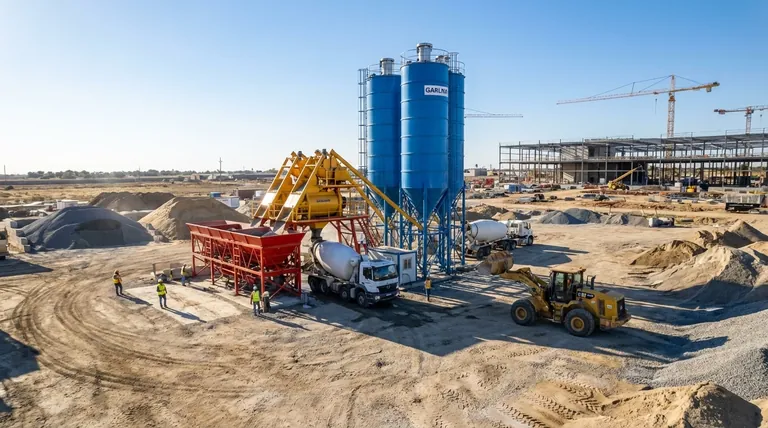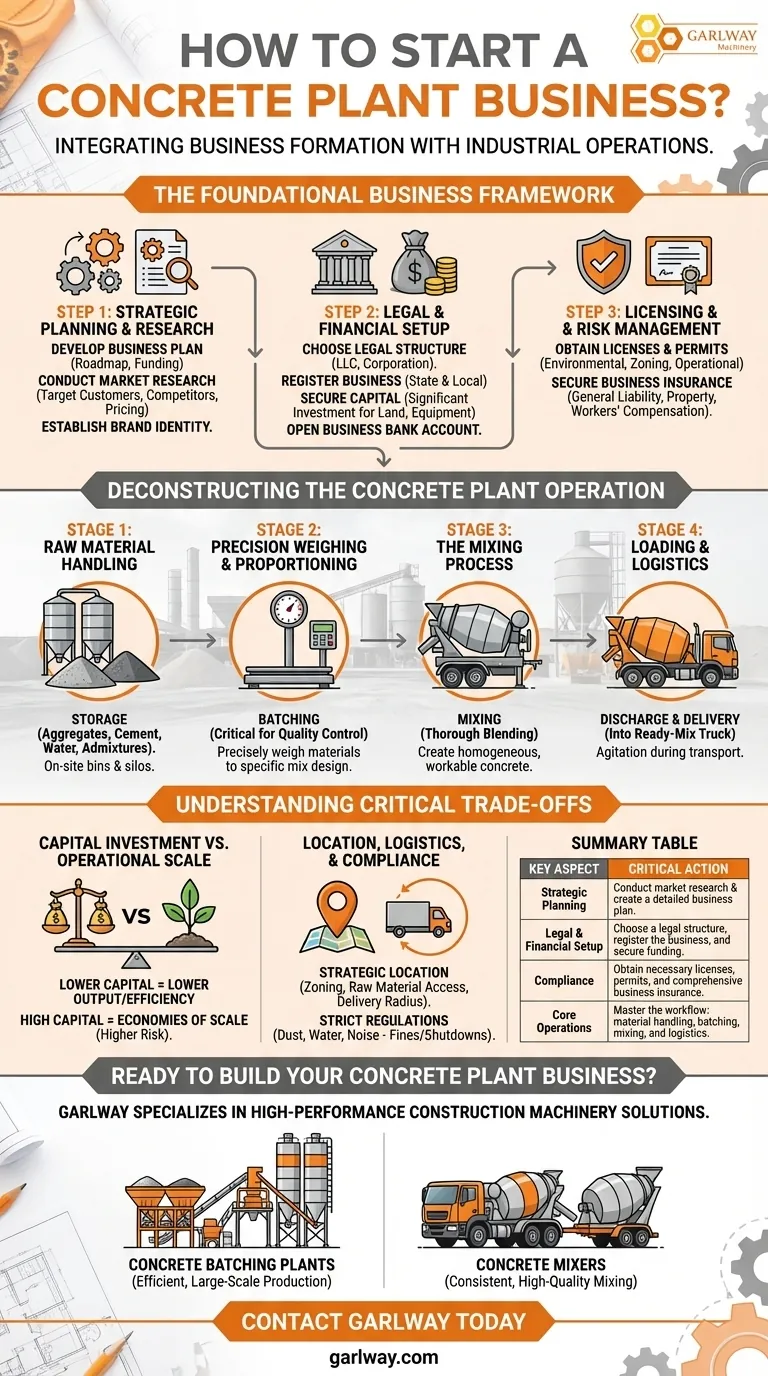To start a concrete plant business, you must integrate standard business formation procedures with the complexities of industrial operations. The process involves comprehensive market research, creating a detailed business plan, securing significant funding, and navigating the legal requirements for registration, licensing, and insurance.
Success in the concrete plant industry hinges on more than a simple startup checklist. It requires a deep understanding of the capital-intensive nature of the business and a mastery of the core operational workflow, from managing raw materials to delivering the final product.

The Foundational Business Framework
Before a single yard of concrete is mixed, a solid business structure must be in place. This involves careful planning, legal establishment, and financial preparation.
Step 1: Strategic Planning and Research
Your first step is to develop a comprehensive business plan. This document is your roadmap, essential for securing funding and guiding your decisions.
This plan must be built on thorough market research. Identify your target customers (contractors, government projects), analyze competitors, and determine your pricing strategy. You will also choose a business name and brand identity.
Step 2: Legal and Financial Setup
You must choose a legal structure for your business, such as an LLC or a corporation. This decision impacts your liability, taxes, and ability to raise capital.
Next, you will formally register your business with the appropriate state and local authorities. This is also the stage where you must secure funding, as a concrete plant is a capital-intensive venture requiring significant investment in land, equipment, and materials.
Finally, open a dedicated business bank account and credit card to keep your finances separate and maintain clear records for tax and accounting purposes.
Step 3: Licensing and Risk Management
Operating a concrete plant requires specific licenses and permits. These often include environmental permits, zoning approvals, and operational licenses from local and state agencies.
Proper business insurance is non-negotiable. You will need general liability, property, and workers' compensation insurance to protect your investment and your team from the inherent risks of an industrial operation.
Deconstructing the Concrete Plant Operation
Understanding the day-to-day workflow is critical. A concrete plant is a sophisticated production line with four primary stages.
Stage 1: Raw Material Handling
The process begins with the storage of raw materials. This includes aggregates (sand, gravel), cement, water, and any chemical admixtures. These are typically stored in large bins and silos on-site.
Stage 2: Precision Weighing and Proportioning
This is the most critical stage for quality control. The raw materials are precisely weighed and measured according to a specific mix design. The accuracy of this batching process determines the strength and consistency of the final concrete.
Stage 3: The Mixing Process
Once proportioned, the materials are transferred to a large industrial mixer. Here, they are thoroughly blended to create homogeneous, workable concrete ready for delivery.
Stage 4: Loading and Logistics
The finished concrete is discharged from the mixer directly into a ready-mix truck. This vehicle continues to agitate the concrete during transport to prevent it from setting before it reaches the construction site.
Understanding the Critical Trade-offs
Starting a concrete plant business involves navigating significant strategic decisions and potential pitfalls. Your choices will have long-term consequences.
Capital Investment vs. Operational Scale
A smaller, simpler plant requires less initial capital but may have lower output and efficiency. A large, highly automated plant offers economies of scale but demands a massive upfront investment, making it a higher-risk venture.
Location, Location, Logistics
Your plant's location is a critical success factor. It must be zoned for industrial use and provide cost-effective access to raw materials. Furthermore, since concrete has a limited delivery radius before it hardens, your site must be strategically located to serve your target market.
Regulatory and Environmental Compliance
Concrete plants face strict environmental regulations. Managing dust, controlling water runoff, and adhering to noise ordinances are major operational challenges. Failure to comply can result in fines and shutdowns, making proactive management essential.
How to Apply This to Your Venture
Your strategic approach should align directly with the scale and nature of the business you intend to build.
- If your primary focus is a smaller, localized operation: Concentrate on a detailed local market analysis and begin the process of securing zoning and environmental permits as early as possible.
- If your primary focus is becoming a large-scale regional supplier: Prioritize creating a professional business plan designed to secure significant capital and develop a robust logistics and supply chain strategy from day one.
Building a successful concrete plant begins with a solid foundation of meticulous planning and a clear understanding of the industry's operational demands.
Summary Table:
| Key Aspect | Critical Action |
|---|---|
| Strategic Planning | Conduct market research & create a detailed business plan. |
| Legal & Financial Setup | Choose a legal structure, register the business, and secure funding. |
| Compliance | Obtain necessary licenses, permits, and comprehensive business insurance. |
| Core Operations | Master the workflow: material handling, batching, mixing, and logistics. |
Ready to Build Your Concrete Plant Business?
Launching a successful operation requires reliable, high-performance equipment. GARLWAY specializes in providing construction machinery solutions for construction companies and contractors globally.
We offer a range of essential products, including:
- Concrete Batching Plants for efficient, large-scale production.
- Concrete Mixers for consistent and high-quality mixing.
Let our expertise help you build a solid foundation for your business. Contact GARLWAY today to discuss your equipment needs and how we can support your venture's success.
Visual Guide

Related Products
- HZS120 Ready Mix Concrete Batching Plant Commercial Mud Cement Mixer
- JW1000 Mobile Cement Mixer Concrete Mixer Truck and Batching Plant
- Hydraulic Concrete Mixer Machine Cement Mixing Equipment for Mixture Concrete
- HZS75 Concrete Batching Plant Cement Mixer Price Concrete Mixer Bunnings Mixing Plant
- HZS35 Small Cement Concrete Mixing Batch Plant
People Also Ask
- How do you maintain a concrete batching plant? Maximize Uptime & Extend Equipment Life
- What are the disadvantages of ready mix concrete? Navigating Logistical and Cost Challenges
- What are the advantages of ready mix concrete? Higher Quality, Efficiency & Cost Savings
- How to make ready mix concrete stronger? Boost Strength with Proven Mixing Techniques
- What are the advantages of a concrete plant? Achieve Consistent Quality & Efficiency for Large-Scale Projects














